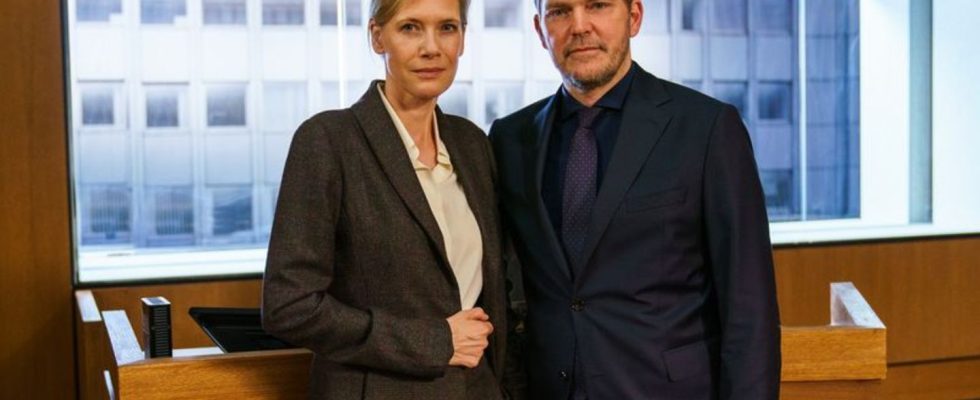Streaming to have your say
Two truths – one process: The new Schirach drama
In Ferdinand von Schirach’s new court drama, Ina Weisse and Godehard Giese play a former couple who face each other in court. photo
© Julia Terjung/ZDF/dpa
They were once a couple – even if they were married to other people. But then one encounter changed everything. The former lovers face each other in court.
There are a lot of dates to remember: von Schirach’s piece premiered in Vienna in September and was published in book form on February 28th. Two days earlier, on February 26th, ZDF broadcast the television film “She says. He says.”, for which von Schirach wrote the script and which is based on the play. The film is already available in advance in the ZDF media library.
The court drama in the second is staged by Matti Geschonneck as a legal chamber play. Ina Weisse plays the TV presenter Katharina Schlüter, who accuses the industrialist Christian Thiede (Godehard Giese) of rape. The two had a secret affair for years, and now they are sitting opposite each other in the courtroom.
Schlüter, as co-plaintiff and witness, has the floor – her ex-lover defends himself in silence. On the witness stand, Schlüter describes how what was initially consensual sex in Thiede’s apartment turned into rape. But are circumstantial evidence such as semen traces on the dress she wore that day sufficient as evidence?
Thiede’s defense attorney Breslau (Henriette Confurius) paints a different picture: an abandoned lover wants revenge for the separation she didn’t want and has invented the incident. Schlüter’s lawyer Biegler (Matthias Brandt), on the other hand, points to his client’s frozen career and the pending divorce: The disclosure of the secret relationship in the course of reporting the rape also meant the end of their marriage.
Von Schirach: “No truth at any price.”
What is truth? This is the question that judges have to deal with every day, especially in circumstantial proceedings or when testimony is pitted against testimony. Perhaps this is precisely why the justice genre is so popular in literature and film, as readers or viewers also have to form an opinion – guilty or innocent, truth or lie?
Von Schirach is a lawyer himself and worked as a criminal defense lawyer. Maybe it’s also because the presiding judge and the representative of the public prosecutor’s office remain rather pale. It is above all the lawyers Breslau and Biegler who are given the biggest stage for a legal exchange of blows. It is a little more excited and emotional than is usual in everyday criminal proceedings in German courts.
The author himself also takes the floor in a voice-over: In a constitutional state, a person’s guilt or innocence is not decided in newspapers, not on television, not on social media and not in internet forums, he warns. “In a criminal case, the judges try to find out the truth. They listen to witnesses and experts, they carefully look at the evidence presented, they examine the arguments of the public prosecutor, the co-plaintiff and the defense attorney. But there is no truth at any price.”
It is only logical that at the end of the film there is not a verdict, but rather the audience is confronted with the statements of both parties. Who told the truth? The open ending is likely to lead to some audience discussion after the credits roll.

